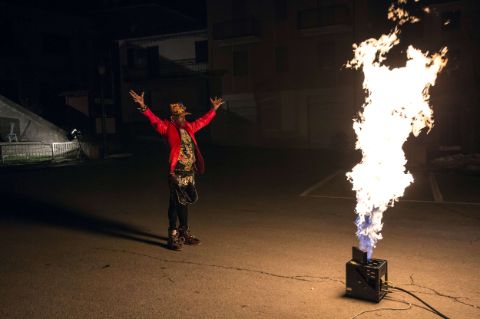The Sonic Vernacular: Blackness, Sound, and Fugitivity
David Scott and Layla Zami
Screenings, Conversation
Fr., 9.6.2023
18:00–22:00
Miriam Makeba Auditorium
Free entry

Invernomuto, Negus (2016) Photo: Moira Ricci, production still
Framed by two films, David Scott and Layla Zami engage in the history of Caribbean revolutions through call-and-response, a musical format deeply rooted in the Black radical tradition.
In collaboration with the RTG Minor Cosmopolitanisms, University of Potsdam, where Scott is a Mercator Fellow for the summer.
18:00
Negus – Lee ‘Scratch’ Perry
Invernomuto, Italy 2013, 11', Jamaican English
Negus (2011–16) is a cross-media project that explores the convergence of history, myth, and magic through the ambivalent and manifold legacies of Ethiopia’s last emperor Haile Selassie I. Embodied through Lee ‘Scratch’ Perry—godfather of dub music and foundational to the sound and culture of reggae—the film evokes a spiritual ghost hovering over Black Ark, Perry’s personal recording studio in Kingston, Jamaica that he burned to the ground in the 1980s. In a central scene in the film, Perry becomes a master of the ritual fire ceremony performed in the artists’ hometown of Vernasca, Northern Italy, to re-invoke the spirit of Haile Selassie I. In Italy, during the fascist rule of Mussolini, Selassie was portrayed as a Black devil. During the same period, the cult of Rastafari was emerging in Jamaica and claiming Selassie as their living god and Black Christ resurrected. The project unfolds in cyclical time and its locations (Italy, Ethiopia, and Jamaica) are always in flux, reflecting the complex, entangled, and infinite multiplicities of communities, ideologies, and mythologies.
18:30
A Call-and-Response as Keynote with David Scott and Layla Zami
Conversation
Taking on different forms of violence across the globe, colonialism has shaped not only infrastructure, resource distribution, and politics, but also the sonic environments that engage and connect people and movements. During the age of formal decolonization, music and musicians from colonized spaces were first and foremost activists and used their art to express anti-colonial visions for the future. Their music was, and must be considered as, part of the anti-colonial struggle. Together with David Scott and Layla Zami, visitors take a journey through sonic landscapes of the African diaspora to reflect on their ties to the Black radical tradition, through call-and-response, a form of solidarity and community building.
Taking on different forms of violence across the globe, colonialism has shaped not only infrastructure, resource distribution, and politics, but also the sonic environments that engage and connect people and movements. During the age of formal decolonization, music and musicians from colonized spaces were first and foremost activists and used their art to express anti-colonial visions for the future. Their music was, and must be considered as, part of the anti-colonial struggle. Together with David Scott and Layla Zami, visitors take a journey through sonic landscapes of the African diaspora to reflect on their ties to the Black radical tradition, through call-and-response, a form of solidarity and community building.
For the lecture David Scott has curated a playlist that gathers Jamaican ska and reggae from the 1960s and 70s. The selection points to the beginnings of ska, with early Bob Marley track ‘Simmer Down’ pointing to his ambivalent relationship with his mentor Lee ‘Scratch’ Perry. Perry once stated that he grew up with ‘revolution in my brain, revolution in my leg, and revolution in my head’. This struggle and the growing pains of a young nation emerging out of a violent history under British colonial rule expresses itself in collaborations across the board, having influenced the sound of Dennis Brown, Gregory Isaacs, or Burning Spear. This history is accumulated into one sonic journey in a playlist representing an alternative narrative of place and exchange, and of cultural collaboration in the aftermath of revolution.
You can listen to the playlist on Spotify
20:30
PICO: Un Parlante de África en América
Invernomuto, Jim Christopher Nedd, Italy/USA 2017, 60', Spanish with English subtitles
The documentary film PICO: Un Parlante de África en América explores the extravagant cultural richness of the picó tradition. Picó refers to wooden structures covered in striking painted artworks, which house the powerful sound systems that animate the streets, bars, and restaurants in the Afro-Colombian cities of Barranquilla and Cartagena. In the film, various actors involved in the production and dissemination of picó come together to track and engage with its legacies and historical points along the transatlantic routes of the enslaved. It is no coincidence that picós emerged here as this part of the Atlantic coastal region is an intersecting point for numerous African and Indigenous cultures. Their coalescence resulted in a sonic style desiring a vibrant and aesthetic portable home that mirrored its own impure and multiplicitous origins. In this form, picó is the vehicle of the diasporic vernacular of rhythm and language, it unites a diverse set of subjectivities that are empowered through dance, music, and collectivity.
Further events featuring David Scott:
Sat., 3.6.2023 16:00
Between Revolution and Repair: Rereading Walter Rodney’s “How Europe Underdeveloped Africa”
Keynote Lecture
Fri., 7.7.2023 16:00–20:00
on movement(s) and collectives—Black Radicals in/and Berlin
Keynote Conversation